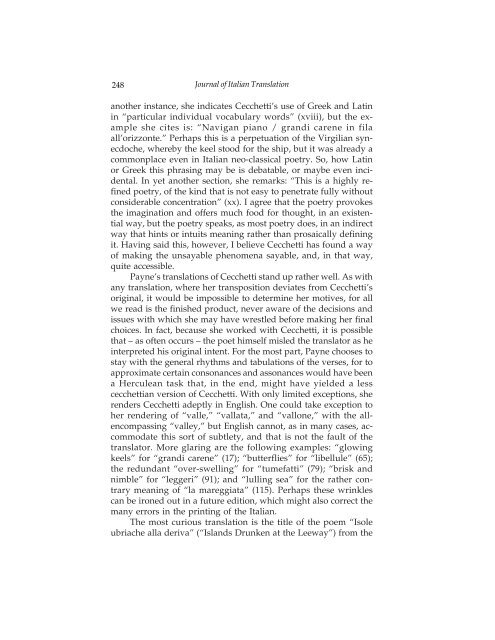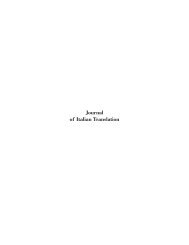Journal of Italian Translation - Brooklyn College - Academic Home ...
Journal of Italian Translation - Brooklyn College - Academic Home ...
Journal of Italian Translation - Brooklyn College - Academic Home ...
Create successful ePaper yourself
Turn your PDF publications into a flip-book with our unique Google optimized e-Paper software.
248<br />
<strong>Journal</strong> <strong>of</strong> <strong>Italian</strong> <strong>Translation</strong><br />
another instance, she indicates Cecchetti’s use <strong>of</strong> Greek and Latin<br />
in “particular individual vocabulary words” (xviii), but the example<br />
she cites is: “Navigan piano / grandi carene in fila<br />
all’orizzonte.” Perhaps this is a perpetuation <strong>of</strong> the Virgilian synecdoche,<br />
whereby the keel stood for the ship, but it was already a<br />
commonplace even in <strong>Italian</strong> neo-classical poetry. So, how Latin<br />
or Greek this phrasing may be is debatable, or maybe even incidental.<br />
In yet another section, she remarks: “This is a highly refined<br />
poetry, <strong>of</strong> the kind that is not easy to penetrate fully without<br />
considerable concentration” (xx). I agree that the poetry provokes<br />
the imagination and <strong>of</strong>fers much food for thought, in an existential<br />
way, but the poetry speaks, as most poetry does, in an indirect<br />
way that hints or intuits meaning rather than prosaically defining<br />
it. Having said this, however, I believe Cecchetti has found a way<br />
<strong>of</strong> making the unsayable phenomena sayable, and, in that way,<br />
quite accessible.<br />
Payne’s translations <strong>of</strong> Cecchetti stand up rather well. As with<br />
any translation, where her transposition deviates from Cecchetti’s<br />
original, it would be impossible to determine her motives, for all<br />
we read is the finished product, never aware <strong>of</strong> the decisions and<br />
issues with which she may have wrestled before making her final<br />
choices. In fact, because she worked with Cecchetti, it is possible<br />
that – as <strong>of</strong>ten occurs – the poet himself misled the translator as he<br />
interpreted his original intent. For the most part, Payne chooses to<br />
stay with the general rhythms and tabulations <strong>of</strong> the verses, for to<br />
approximate certain consonances and assonances would have been<br />
a Herculean task that, in the end, might have yielded a less<br />
cecchettian version <strong>of</strong> Cecchetti. With only limited exceptions, she<br />
renders Cecchetti adeptly in English. One could take exception to<br />
her rendering <strong>of</strong> “valle,” “vallata,” and “vallone,” with the allencompassing<br />
“valley,” but English cannot, as in many cases, accommodate<br />
this sort <strong>of</strong> subtlety, and that is not the fault <strong>of</strong> the<br />
translator. More glaring are the following examples: “glowing<br />
keels” for “grandi carene” (17); “butterflies” for “libellule” (65);<br />
the redundant “over-swelling” for “tumefatti” (79); “brisk and<br />
nimble” for “leggeri” (91); and “lulling sea” for the rather contrary<br />
meaning <strong>of</strong> “la mareggiata” (115). Perhaps these wrinkles<br />
can be ironed out in a future edition, which might also correct the<br />
many errors in the printing <strong>of</strong> the <strong>Italian</strong>.<br />
The most curious translation is the title <strong>of</strong> the poem “Isole<br />
ubriache alla deriva” (“Islands Drunken at the Leeway”) from the
















